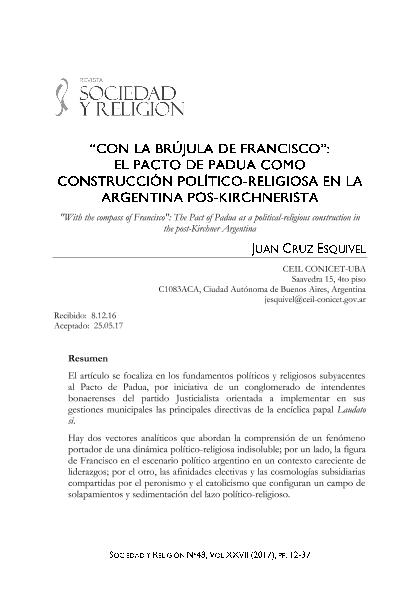Artículo
El artículo se focaliza en los fundamentos políticos y religiosos subyacentes al Pacto de Padua, iniciativa de un conglomerado de intendentes bonaerenses del partido Justicialista orientada a implementar en sus gestiones municipales las principales directivas de la encíclica papal Laudato si. Hay dos vectores analíticos que abordan la comprensión de un fenómeno portador de una dinámica político-religiosa indisoluble; por un lado, la figura de Francisco en el escenario político argentino en un contexto careciente de liderazgos; por el otro, las afinidades electivas y las cosmologías subsidiarias compartidas por el peronismo y el catolicismo que configuran un campo de solapamientos y sedimentación del lazo político-religioso. En tanto construcción político-religiosa, el Pacto de Padua contribuye a reforzar la presencia pública de la Iglesia católica y a instituir “lo religioso” como herramienta complementaria para la acumulación política. El acuerdo reproduce así rasgos históricos que han marcado a la cultura política argentina, específicamente aquellos que han forjado una identidad y una praxis política apelando a referencias -institucionales y simbólicas- del mundo religioso. The article focuses on the political and religious foundations underlying the Pact of Padua, an initiative of a conglomerate of intendants from Buenos Aires province, Argentina. The agreement aims at implementing the main guidelines of the papal Encyclical Laudato si in their municipal administrations. Two analytical vectors are approached to understand a phenomenon bearing an indissoluble political-religious dynamic. On the one hand, the role of Francis in the Argentine political scene in a lacking context of leadership. On the other hand, the elective affinities and subsidiary cosmologies between Peronism and Catholicism that form a field of overlap and sedimentation of the political-religious tie. As a political-religious construction, the Pact of Padua contributes to reinforce the public presence of the Catholic Church and to institute ―religious‖ as a complementary tool for political accumulation. In that sense, the covenant reproduces historical features that have marked the Argentine political culture, specifically those that have forged an identity and a political praxis invoking institutional and symbolic references of the religious world.
Con la brújula de Francisco: El Pacto de Padua como construcción político-religiosa en la Argentina pos-kirchnerista
Título:
"With the compass of Francisco": The Pact of Padua as a political-religious construction in the post-Kirchner Argentina
Fecha de publicación:
10/2017
Editorial:
Centro de Estudios e Investigaciones Laborales
Revista:
Sociedad y Religión
ISSN:
0326-9795
Idioma:
Español
Tipo de recurso:
Artículo publicado
Clasificación temática:
Resumen
Palabras clave:
Religion
,
Politica
,
Papa Francisco
,
Argentina
Archivos asociados
Licencia
Identificadores
Colecciones
Articulos(CEIL)
Articulos de CENTRO DE ESTUDIOS E INVESTIGACIONES LABORALES
Articulos de CENTRO DE ESTUDIOS E INVESTIGACIONES LABORALES
Citación
Esquivel, Juan Cruz; Con la brújula de Francisco: El Pacto de Padua como construcción político-religiosa en la Argentina pos-kirchnerista; Centro de Estudios e Investigaciones Laborales; Sociedad y Religión; 27; 48; 10-2017; 12-37
Compartir




